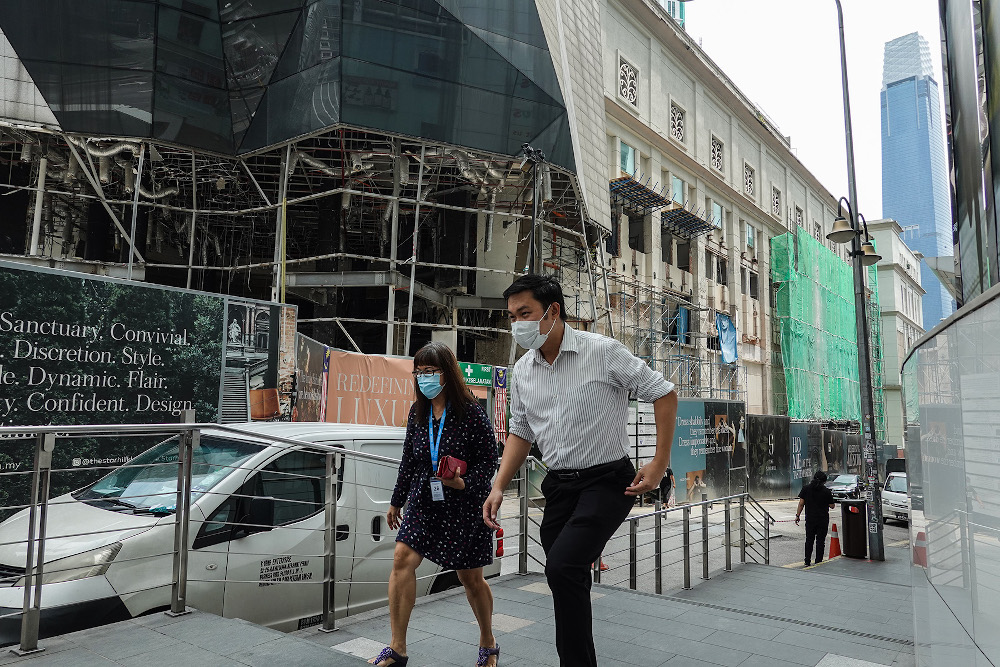KUALA LUMPUR, Oct 22 — Employers in conditional movement control order (CMCO) areas have to follow the 10am to 2pm timing for when the maximum 10 per cent of their management and supervisory staff are allowed in office throughout the CMCO period, the Ministry of International Trade and Industry (Miti) said today.
Today was the first day of when the government’s work-from-home (WFH) order for management and supervisory staff of companies in CMCO areas kicked in. The government had first announced this on Tuesday and provided some details yesterday.
In a list of frequently asked questions (FAQ) released tonight on its Facebook page, Miti stressed that it is compulsory for “industries” in CMCO areas to practise the WFH policy for its management and supervisory staff who carry out tasks such as those related to accounting, finance, administration, law, planning and ICT.
Miti reaffirmed that only 10 per cent of such management and supervisory staff are allowed to be in the office for three days a week, and with four hours only for each day from 10am to 2pm.
In addressing the question of whether employers would be able to change this permitted office timing for the 10 per cent of management and supervisory staff, Miti said: “No. Employers have to comply with the rules on the frequency and duration of work at office which is a maximum of three days a week for four hours each day from 10am to 2pm.”
As to how this would work out in practice, Miti gave an example: “For example, if there are 10 or less within the management and supervisory group, only one is allowed to come to the office at any one time.”
Miti indicated, however, that taking turns to come to the office is allowed for such staff.
“The company can carry out a rotation system to determine the representatives from the management and supervisory group that have to be present in the office. The company is also advised to prepare a list of workers that are involved for work from home and also in company operations for the reference of the authorities, if required,” Miti’s FAQ read.
Miti also said that employers are required to issue a letter of approval for travel for each employee that is allowed to work during the CMCO.
As for who would fall under the category of management and supervisory staff, Miti said this would be “subject to company policy”.
The employees’ work from home would also be according to the procedure or guidelines determined by the employer according to the needs of the respective companies, Miti said.
In the same set of FAQs, Miti addressed the question of what the employer could do if an employee does not want to come for work and wants to work from home, stating: “The employer can take action based on discretion and the company’s procedure based on the related government policy and Act. For any further questions on this, please refer to the Department of Labour.”
On whether employees that have to go to the office are required to carry out Covid-19 tests, Miti in its FAQ replied that Covid-19 screening is “only compulsory for foreign workers in the construction sector, security guards and all workers from red zones with symptoms only”.
In the FAQ, Miti listed out sectors that do not fall under the work from home directive, namely employees under the informal sector such as the retail sector, food, plantation, agriculture, hawkers, food stalls, restaurants, food courts, grocery stores, and convenience stores.
Miti said these employees in the informal sector are allowed to work as usual according to the standard operating procedures under CMCO.
Miti said that employees of transport services such as public transport, express buses, LRT, taxis, e-hailing and food delivery services can also work as usual.
Other than providing answers to FAQs on the work from home directive, Miti also provided answers to general questions on economic activities during the CMCO period, stating that all economic activities and industries (manufacturing) are allowed to operate without Miti’s approval but subject to the SOPs determined by the National Security Council (NSC). Miti said the latest SOP can be found on the NSC’s website www.mkn.gov.my.
Among other things, Miti said that business vehicles carrying goods and services are allowed to enter and exit CMCO areas with the use of either employee pass or employer’s approval letter.
Miti further said that movement of employees within CMCO areas or employees crossing state borders for work purposes into CMCO areas would both be allowed, provided that employees carry an employee pass or an approval letter from the employer.
As to the general question on whether all employees of a company are allowed to come to work, Miti said the management of workers’ presence is under the company’s discretion, before going on to say: “However, the employer is encouraged to allow workers to work from home during the CMCO period. However, in whatever circumstances, the company must comply with the SOP determined.” It then referred employers to the section in its FAQ that dealt with the work from home order.
At the end of its FAQ, Miti also noted that any latest changes in line with the latest orders from the NSC and the Health Ministry would be notified from time to time.
CMCO is currently imposed on Sabah from October 13 to October 26, and on Selangor, Kuala Lumpur, and Putrajaya from October 14 to October 27, and on Labuan from October 17 to October 30.
Employers in CMCO areas who wish to find out more about where they can get free Covid-19 testing for their employees or get a maximum RM150 subsidy for Covid-19 tests for their employees can refer to this news report, based on the Social Security Organisation (Socso) and Human Resources Ministry’s announcements yesterday.



















